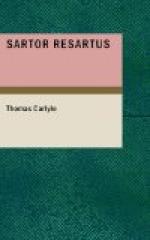“By this Art, which whoso will may sacrilegiously degrade into a handicraft,” adds Teufelsdrockh, “have I thenceforth abidden. Writings of mine, not indeed known as mine (for what am I?), have fallen, perhaps not altogether void, into the mighty seedfield of Opinion; fruits of my unseen sowing gratifyingly meet me here and there. I thank the Heavens that I have now found my Calling; wherein, with or without perceptible result, I am minded diligently to persevere.
“Nay how knowest thou,” cries he, “but this and the other pregnant Device, now grown to be a world-renowned far-working Institution; like a grain of right mustard-seed once cast into the right soil, and now stretching out strong boughs to the four winds, for the birds of the air to lodge in,—may have been properly my doing? Some one’s doing, it without doubt was; from some Idea, in some single Head, it did first of all take beginning: why not from some Idea in mine?” Does Teufelsdrockh, here glance at that “SOCIETY FOR THE CONSERVATION OF PROPERTY (Eigenthums-conservirende Gesellschaft),” of which so many ambiguous notices glide spectra-like through these inexpressible Paper-bags? “An Institution,” hints he, “not unsuitable to the wants of the time; as indeed such sudden extension proves: for already can the Society number, among its office-bearers or corresponding members, the highest Names, if not the highest Persons, in Germany, England, France; and contributions, both of money and of meditation pour in from all quarters; to, if possible, enlist the remaining Integrity of the world, and, defensively and with forethought, marshal it round this Palladium.” Does Teufelsdrockh mean, then, to give himself out as the originator of that so notable Eigenthums-conservirende ("Owndom-conserving”) Gesellschaft; and if so, what, in the Devil’s name, is it? He again hints: “At a time when the divine Commandment, Thou shalt not steal, wherein truly, if well understood, is comprised the whole Hebrew Decalogue, with Solon’s and Lycurgrus’s Constitutions, Justinian’s Pandects, the Code Napoleon, and all Codes, Catechisms, Divinities, Moralities whatsoever, that man has hitherto devised (and enforced with Altar-fire and Gallows-ropes) for his social guidance: at a time, I say, when this divine Commandment has all but faded away from the general remembrance; and, with little disguise, a new opposite Commandment, Thou shalt steal, is everywhere promulgated,—it perhaps behooved, in this universal dotage and deliration, the sound portion of mankind to bestir themselves and rally. When the widest and wildest violations of that divine right of Property, the only divine right now extant or conceivable, are sanctioned and recommended by a vicious Press, and the world has lived to hear it asserted that we have no Property in our very Bodies, but only an accidental Possession and Life-rent, what is the issue to be looked for? Hangmen and Catchpoles may, by




